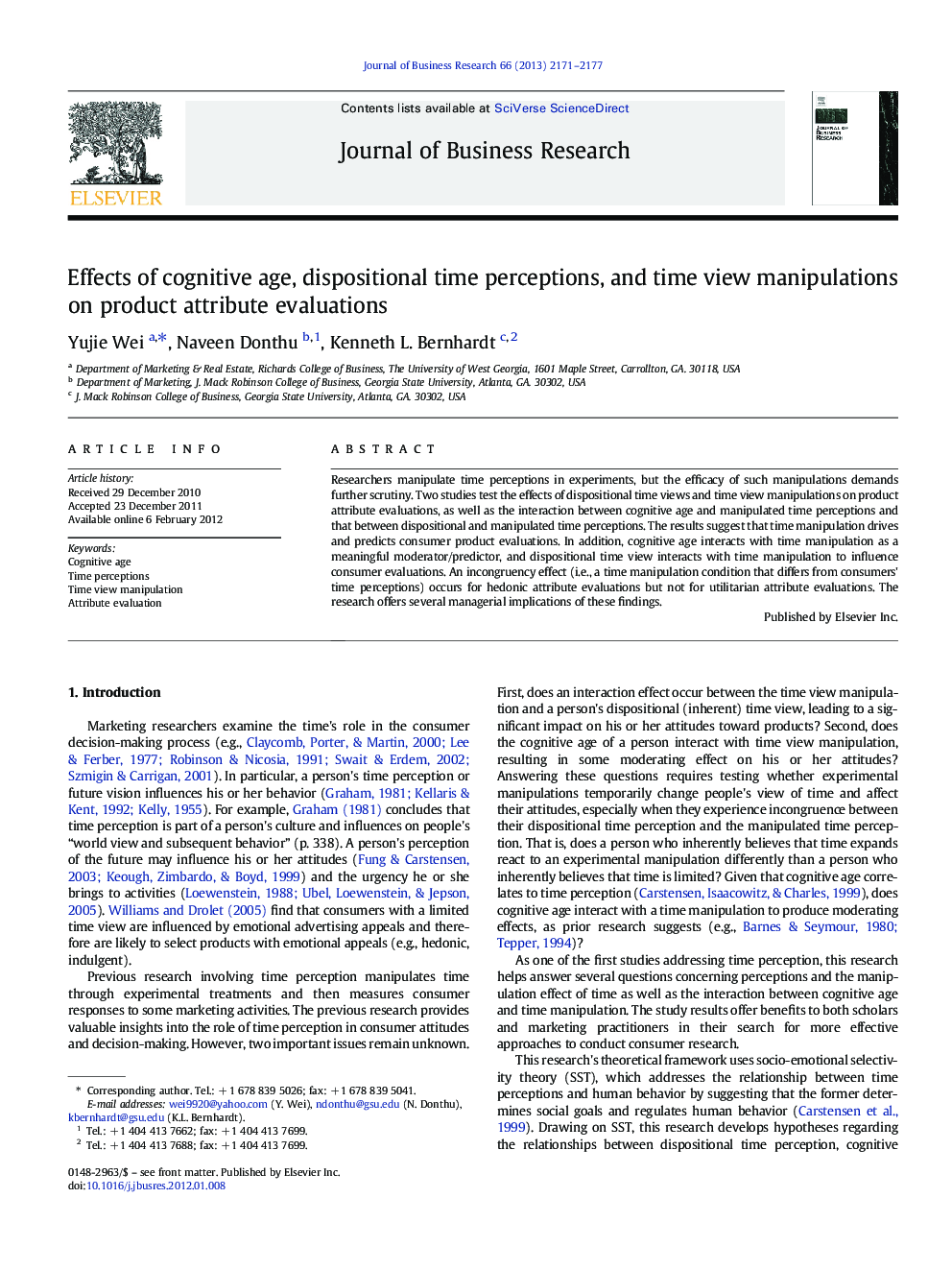| کد مقاله | کد نشریه | سال انتشار | مقاله انگلیسی | نسخه تمام متن |
|---|---|---|---|---|
| 10493000 | 940309 | 2013 | 7 صفحه PDF | دانلود رایگان |
عنوان انگلیسی مقاله ISI
Effects of cognitive age, dispositional time perceptions, and time view manipulations on product attribute evaluations
ترجمه فارسی عنوان
تأثیرات سن شناختی، ادراک زمان در نظر گرفته شده و زمانبندی دیدگاه ها بر ارزیابی ویژگی های محصول
دانلود مقاله + سفارش ترجمه
دانلود مقاله ISI انگلیسی
رایگان برای ایرانیان
کلمات کلیدی
سن شناختی، ادراکات زمان، دستکاری زمان نمایش، ارزیابی ویژگی،
ترجمه چکیده
محققان ادراکات زمان را در آزمایش ها ادغام می کنند، اما کارایی چنین دستکاری ها مستلزم بررسی دقیق تر است. دو مطالعه، تأثیرات دیدگاه های زمان بندی و دیدگاه زمان را بر ارزیابی ویژگی های محصول، و همچنین تعامل بین سن شناختی و ادراک زمان دستکاری، و بین ادراکات زمانی و غلط را بررسی می کنند. نتایج نشان می دهد که دستکاری زمان در حال پیش بینی و ارزیابی محصولات مصرفی است. علاوه بر این، سن شناختی با دستکاری زمان به عنوان یک مدرک معتبر / پیش بینی کننده معنی تعامل می کند و دیدگاه موقتی ایفا می کند با دستکاری زمان برای تاثیر گذاری بر ارزیابی مصرف کننده. اثر غیرمستقیم (به عنوان مثال، شرایط دستکاری زمان که از ادراک زمان مصرف کننده متفاوت است) برای ارزیابی ویژگی های هدیونی، اما نه برای ارزیابی ویژگی های سودمند، رخ می دهد. این پژوهش چندین معیار مدیریتی این یافته ها را ارائه می دهد.
موضوعات مرتبط
علوم انسانی و اجتماعی
مدیریت، کسب و کار و حسابداری
کسب و کار و مدیریت بین المللی
چکیده انگلیسی
Researchers manipulate time perceptions in experiments, but the efficacy of such manipulations demands further scrutiny. Two studies test the effects of dispositional time views and time view manipulations on product attribute evaluations, as well as the interaction between cognitive age and manipulated time perceptions and that between dispositional and manipulated time perceptions. The results suggest that time manipulation drives and predicts consumer product evaluations. In addition, cognitive age interacts with time manipulation as a meaningful moderator/predictor, and dispositional time view interacts with time manipulation to influence consumer evaluations. An incongruency effect (i.e., a time manipulation condition that differs from consumers' time perceptions) occurs for hedonic attribute evaluations but not for utilitarian attribute evaluations. The research offers several managerial implications of these findings.
ناشر
Database: Elsevier - ScienceDirect (ساینس دایرکت)
Journal: Journal of Business Research - Volume 66, Issue 11, November 2013, Pages 2171-2177
Journal: Journal of Business Research - Volume 66, Issue 11, November 2013, Pages 2171-2177
نویسندگان
Yujie Wei, Naveen Donthu, Kenneth L. Bernhardt,
